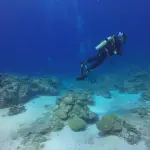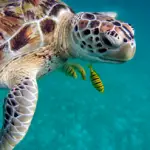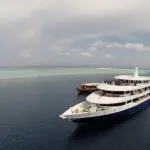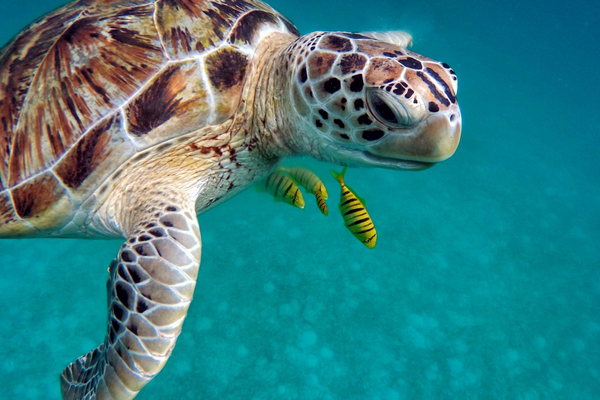
Safe diving in the Maldives
If you’re planning on a trip to scuba dive in the Maldives, you are probably wondering whether it’s safe to scuba dive there.
So is scuba diving safe in the Maldives? Some of the best dives in the Maldives have strong currents and challenging conditions but the scuba diving is safe. Some dives can be deep and involve diving at night from liveaboards, but so long as you have the appropriate training and experience and you follow safe diving practices these will also be safe.
The best way to dive the Maldives is by a scuba diving liveaboard. You can check the latest and best deals on Maldives liveaboards using the following window:
Is scuba diving safe in the Maldives in more detail?
If you’re asking this question in order to help you decide on whether you scuba dive the Maldives or not, let me begin by explaining a few things about safe scuba diving, but in context with the supposed dangers of diving in the Maldives.
Whilst scuba diving is considered a dangerous sport, and is statistically more dangerous than skydiving and more dangerous than skiing, there is no reason why it should be if you follow safe diving rules.
What are the supposed dangers of scuba diving in the Maldives?
- Some of the best dives in the Maldives can have strong currents.
- Some of the diving in the Maldives are deep dives.
- There are some dives and especially on the liveaboard dive boats that are night dives.
- The Maldives has dangerous wildlife in the seas around the islands.
- Whilst diving is a relatively low cardiovascular sport, it does require you to be fit and healthy.
- Defective equipment can be a killer!
- Scuba diving with a dive company that doesn’t have a good safety record could be a problem.
Let’s take a look at each of these potential ‘dangers‘ in turn.
1. Some of the best dives in the Maldives can have strong currents
It’s true to say that some of the best dives in Maldives have some serious currents to contend with. These conditions can be challenging even for experienced divers.
However, that being said this should not be a problem if you have the necessary drift diving experience. As it happens I love drift diving and especially if the drift dive is one where you go with the current. This feels like you’re flying and it’s such a great feeling.
However, some of the drift diving in the Maldives isn’t the type where you’re ‘going with the flow’. But instead you are being ‘hooked-in’ on a line to keep your position on a reef.
These two types of current diving are very different and require slightly different approaches to be safe.
Get trained for the diving you intend to do
Do the advanced diver training alongside training for drift diving and get the experience too. But do this before you fly all the way to the Maldives.
This will pay off big time, because as I’ve already said some of the best dives are where some of the strongest currents are found. For example dive sites like Miyaru Kandu in Vaavu Atoll, which has a “Current Rating: Strong“.
The name Miyaru is Dhihevi for shark, so there’s no surprise when I tell you that on this dive site there’s an abundance of grey reef, white tip and black tip sharks to enjoy. But in addition to numerous sharks, you will also experience rays too, including manta rays, and an abundance of pelagic life too.
So while currents can pose a threat to a diver’s safety, so long as you have the necessary training and experience and you dive with a reputable dive company, you should be safe.
More Reading: Liveaboard Maldives 3 days all inclusive (Maldives liveaboard diving trips)
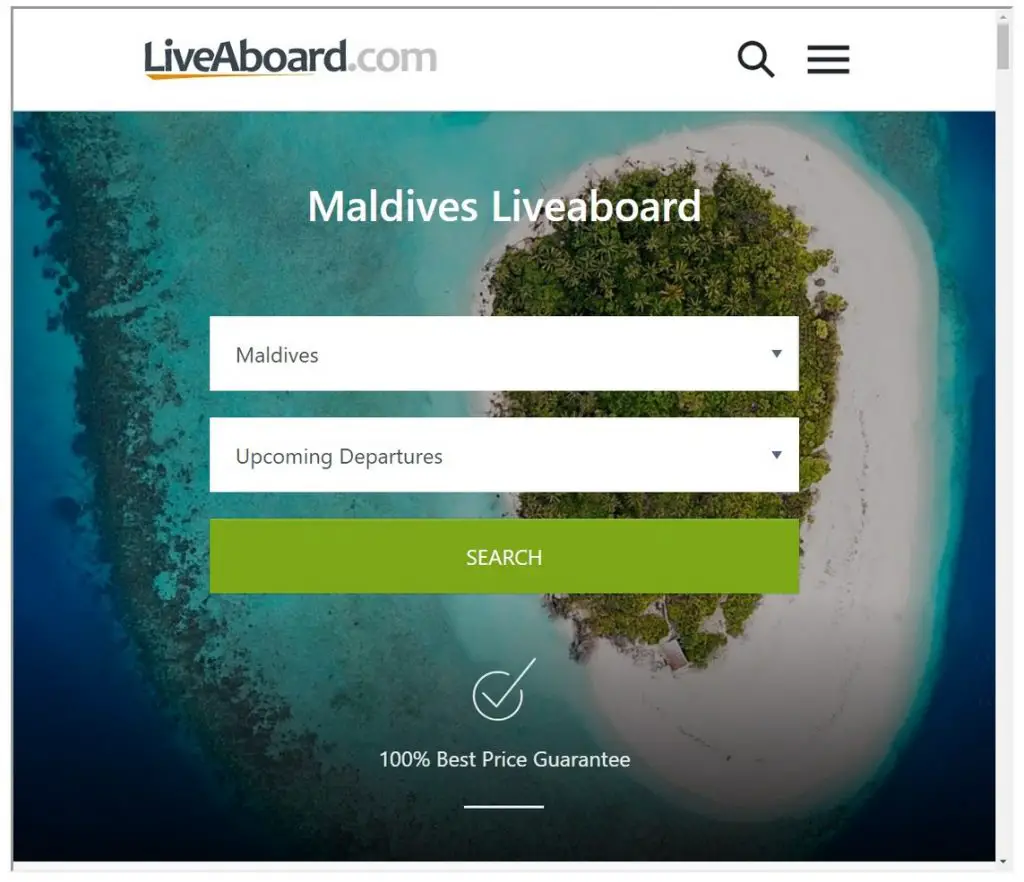
2. Some of the diving in the Maldives are deep dives
Deep diving does carry extra risk than when you’re diving a more shallow dive. The risks associated with deep diving include a higher risk of getting decompression sickness (DCS) and suffering from nitrogen narcosis or raptures of the deep.
Some of the good dives in the Maldives are deeper dives down to around 30 metres (98 feet). If you don’t want to miss out on these dives, you are best to get your advanced diver certification before you go.
But it’s not just about the certification alone. It’s also about building up you experience and depths. If you haven’t dived for a while, you should never go straight to 30 metres as a first dive. It’s always recommended to build your depth over a couple of dives first.
It’s little tips like these and having the experience and confidence that will keep you safe when you’re diving in the Maldives.
This is even if the dive is a deep dive. But also taking point one above as well where it’s a combine deep dive with a strong current too, you need to have confidence underwater, which comes with experience.
Never dive beyond your skill level
Never dive beyond your skill level and experience and you should be safe diving in the Maldives or wherever you decide to dive.
The other important thing to understand is how to keep yourself safe from DCS and to recognise the signs and symptoms of decompression sickness. There is a hyperbaric or decompression chamber in the Maldives.
But it’s important to get there in time. Which is unfortunately what didn’t happen with experienced diver Melanie Stoddart, as reported in the Mail Online where she died of decompression sickness.
in the first case avoid any situation where you might get decompression sickness. But should something happen, make sure to get the help you need and fast!
3. There are some dives and especially on the liveaboard dive boats that are night dives
Night diving is great fun, but it’s important to understand the safety rules when diving at night. It’s not as common to do night diving from a resort in the Maldives, but it is extremely common to night dive from a liveaboard dive boat.
Night diving is safe, but only if you’re diving with a dive company that knows what they are doing and if you are experienced in diving at night and had the necessary training beforehand.
Therefore, if you follows these rules, night diving in the Maldives will be safe.
More Reading: The 9 best budget dive liveaboards Maldives (Cheap Luxury!)
4. The Maldives has dangerous wildlife in the seas around the islands
The waters around the Maldives is no different from any other tropical waters. There are dangerous creatures that live in these waters, including sharks.
However, scuba diving with sharks should not be dangerous, so long as you follow safe practices. This includes no touching and no provoking the sharks.
There are also tiger sharks in the Maldives, which are considered one of the more dangerous sharks in the oceans. But having said that, it’s perfectly safe to scuba dive with these magnificent creatures, so long as you are careful to follow safe shark diving practices.
There are also a lot of nurse sharks in the Maldives too, and whilst they may look docile, they can be dangerous if provoked like any wild animal.
So despite the fact you’ll be able to get close to the nurse sharks in the Maldives, don’t be tempted to touch them!
5. Whilst diving is a relatively low cardiovascular sport, it does require you to be fit and healthy
Being fit and healthy to scuba dive in the Maldives is no different from diving anywhere else in the world. The same rules apply.
Whilst scuba diving isn’t the most cardiovascular challenging sport nor necessarily a good workout, it is still demanding on your body. This is especially true of deeper dives where the risks of decompression sickness and nitrogen narcosis are higher.
As with any diving, always make sure your medical certificate is up to date and pay more attention the older you get. But also pay attention to the heightened risks associated with obesity, if you smoke, if you vape and any other disease where diving may be a higher risk.
Therefore, so long as you are fit and healthy, there’s no reason why the diving in the Maldives should pose a safety risk.
More Reading: How to book last minute liveaboard deals Maldives (Maldives diving deals)
6. Defective equipment can be a killer
I’ve been on a few dives where my buddy’s equipment has failed and I had to go to the rescue. I therefore know more than most about how important it is to keep scuba diving equipment well maintained.
It might be that you intend to take your own diving equipment with you to dive in the Maldives. In which case the safety and maintenance of your equipment is down to you. Make sure you’re regulator has been recently serviced before you fly to the Maldives, as this is your lifeline underwater.
However, you may choose to rent your scuba gear when you’re on holiday in the Maldives, which is also perfectly fine. However, this is when it’s important to choose your tour or dive operator carefully.
Make sure the dive company that you dive with regularly service their equipment. If the equipment looks damaged, old or like it may fail, don’t use it and ask for better equipment.
My recommendation is at the very least you buy your own set of regulators. You then know how up to date they are, when they were last serviced and only you are going to be putting your mouth around the regulator mouthpiece.
More Reading: Maldives liveaboard single cabin (Maldives diving as a single person)
7. Scuba diving with a dive company that doesn’t have a good safety record could be a problem
There are no bad dive companies that I am aware of in the Maldives, but beware of this problem. Most dive companies, be it resort based or on a liveaboard dive boat in the Maldives know better than to get a bad reputation, as this is their livelihood.
Scuba diving forms a big part of the Maldives economy and no company can afford to mess up. So be aware of the reviews given by previous customers about the company before you book your trip and your diving.
In closing, I’d also add that it’s important to consider each dive on its merits and align these to your experience, your diver certification and how you are feeling at the time.
Never do a dive if you cannot comfortably agree to it when considering each of these three factors. Plus never under estimate your gut feeling about something. If it doesn’t feel right, for whatever reason, don’t dive, as there’s always the next dive. Be safe and dive safe!
More Reading: Maldives liveaboard with kids (Family scuba diving holidays)
Table of Maldives liveaboards
This list of Maldives liveaboards is in descending customer rating order, followed by Scuba Diving Luxury Rating (SDE Lux Rating, see below), so the liveaboards with the highest customer rating and the best SDE lux rating will be at the top of the list. If you want to change the list order, use the “Sort by” dropdown below.
| Discover Liveaboard | Customer Rating | SDE Lux Rating % | Flexible Booking | Dive Courses | Dietary Requirements | Nitrox | Gear Rental | |
|---|---|---|---|---|---|---|---|---|
 | Review: White Pearl; Book: White Pearl | 9.6 | 88% | NO | YES | YES | YES | YES |
 | Review: MV Scubaspa Yang; Book: MV Scubaspa Yang | 9.6 | 87% | YES | YES | YES | YES | YES |
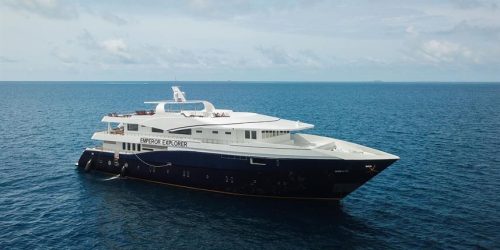 | Review: MV Emperor Explorer; Book: MV Emperor Explorer | 9.6 | 63% | YES | YES | YES | YES | YES |
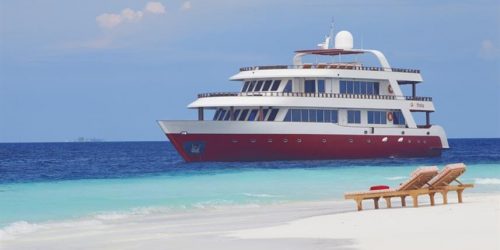 | Review: MV Theia; Book: MV Theia | 9.5 | 85% | YES | YES | YES | YES | YES |
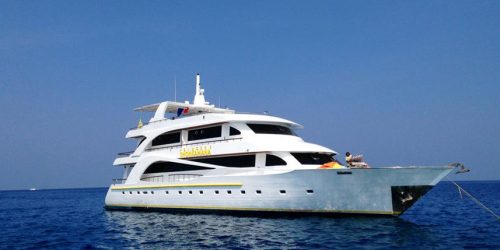 | Review: MY Princess Dhonkamana; Book: MY Princess Dhonkamana | 9.5 | 79% | YES | YES | YES | YES | YES |
 | Review: MV Scubaspa Ying; Book: MV Scubaspa Ying | 9.4 | 87% | YES | YES | YES | YES | YES |
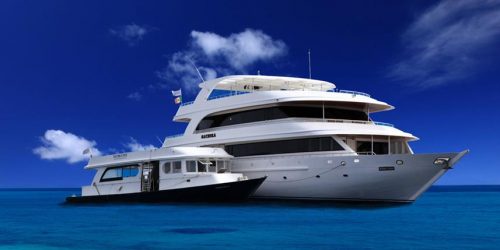 | Review: MV Sachika; Book: MV Sachika | 9.4 | 83% | YES | YES | YES | YES | YES |
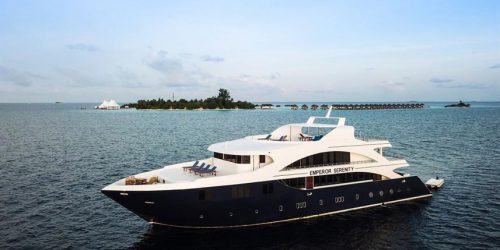 | Review: MV Emperor Serenity; Book: MV Emperor Serenity | 9.4 | 60% | YES | YES | YES | YES | YES |
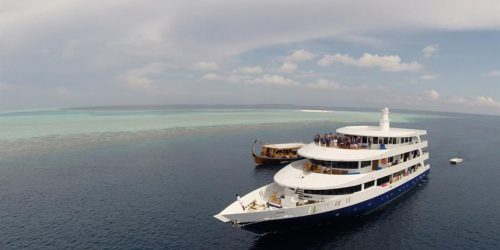 | Review: MV Soleil 2; Book: MV Soleil 2 | 9.3 | 96% | NO | YES | YES | YES | YES |
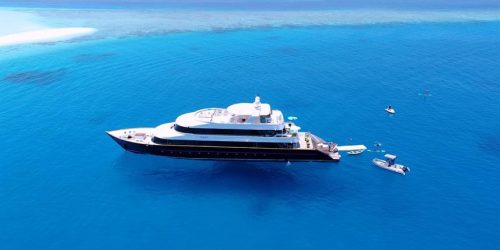 | Review: MV Azalea; Book: MV Azalea | 9.3 | 77% | NO | YES | YES | YES | YES |
The Scuba Diving Earth Luxury Rating (SDE Lux Rating) is explained on each liveaboard review when you click the “Discover Liveaboard” link, and is my own Liveaboard Luxury Rating I’ve assigned to all liveaboards. Choosing between liveaboards is helped by customer scores, and if you get stuck choosing between two or three liveaboards, where each one has a high customer score out of 10, you can use the SDE Luxury Rating to help narrow down your choice.
Think about it like using Booking.com when searching for the best hotel. Booking.com also use a customer score where each customer rates hotels out of 10. This is similar to the liveaboard customer rating, which is also rated out of 10. But let’s say you only like to stay in hotels rated 8 and above on Booking.com, but you also want the hotel to have WIFI or parking, or to have a swimming pool etc. The features each hotel has is usually secondary to the score out of 10.
I hope you enjoyed this article about is scuba diving safe in the Maldives
I’d love to hear from you. Tell us about your adventures of diving and snorkelling. Please use the comments section below. Please also share your photos. Either from your underwater cameras or videos from your waterproof go-pro’s!
If this article hasn’t answered all of your questions. If you have more questions either about snorkelling or scuba diving (or specifically about is scuba diving safe in the Maldives), please comment below with your questions.
There will also be many more articles about scuba and scuba diving safety tips (and on snorkelling too) for you to read and learn about this fabulous sport.
Have fun and be safe!

